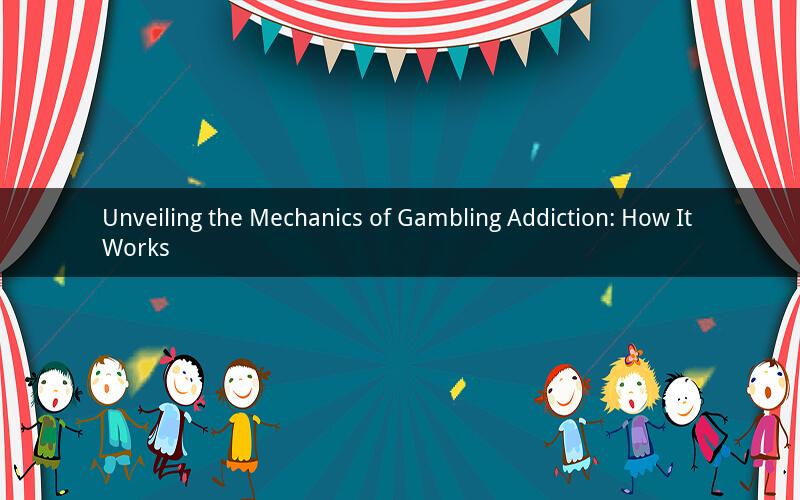
Introduction:
Gambling addiction, a condition that affects millions of individuals worldwide, is a complex issue with profound implications on both personal and societal levels. Understanding how gambling addiction works is crucial in addressing its causes, effects, and potential remedies. This article delves into the intricacies of gambling addiction, exploring its mechanisms and shedding light on its impact on individuals, families, and communities.
1. The Hook: The Allure of Gambling
Gambling addiction often starts with the allure of entertainment and the thrill of winning. Individuals are drawn to the excitement of placing bets, the anticipation of hitting the jackpot, and the temporary sense of euphoria that comes with winning. The psychological and physiological rewards associated with gambling can create a powerful incentive for individuals to engage in this activity repeatedly.
2. The Brain's Reward System
The brain plays a pivotal role in the development and progression of gambling addiction. When individuals gamble, the brain releases dopamine, a neurotransmitter associated with pleasure and reward. The repetitive release of dopamine creates a cycle of reinforcement, making gambling a highly addictive behavior. Over time, the brain's reward system becomes desensitized, requiring more and more stimulation to achieve the same level of pleasure.
3. The Role of Cognitive Biases
Cognitive biases, such as the illusion of control and the availability heuristic, contribute to the development of gambling addiction. The illusion of control refers to the belief that individuals have more control over gambling outcomes than they actually do. This misconception can lead to increased gambling behavior, as individuals feel compelled to prove their ability to win. The availability heuristic, on the other hand, causes individuals to overestimate the likelihood of winning based on recent experiences or media portrayals, further fueling their addiction.
4. The Impact on Behavior and Relationships
Gambling addiction can have severe consequences on an individual's behavior and relationships. As the addiction progresses, individuals may prioritize gambling over other responsibilities, such as work, family, and personal well-being. This can lead to financial difficulties, legal problems, and strained relationships with loved ones. The addiction can also result in increased stress, anxiety, and depression, further exacerbating the individual's dependence on gambling.
5. The Cycle of Addiction
Gambling addiction often follows a cyclic pattern, characterized by four stages: anticipation, action, tension, and relief. During the anticipation stage, individuals feel eager to engage in gambling activities. The action stage involves placing bets and experiencing the associated thrill. The tension stage is marked by anxiety and anticipation of winning, while the relief stage occurs when a win is achieved, providing temporary relief. This cycle repeats, reinforcing the addiction and making it increasingly difficult to break.
6. Treatment and Recovery
Breaking free from gambling addiction requires a comprehensive approach, including therapy, support groups, and lifestyle changes. Cognitive-behavioral therapy (CBT) has proven effective in helping individuals identify and challenge the underlying cognitive biases that contribute to their addiction. Support groups, such as Gamblers Anonymous, provide a sense of community and support for those struggling with addiction. Additionally, adopting healthy coping mechanisms, such as exercise, hobbies, and social activities, can help individuals manage their cravings and reduce the risk of relapse.
7. The Role of Society and Policy
Addressing gambling addiction requires a collaborative effort from society and policymakers. Implementing stricter regulations on gambling, such as limiting access to gambling venues and promoting responsible gambling practices, can help mitigate the risks associated with gambling addiction. Public awareness campaigns and education programs can also play a crucial role in preventing addiction and providing support to those affected.
FAQs:
1. What are the common signs of gambling addiction?
Gambling addiction can manifest through various signs, including financial difficulties, neglecting personal responsibilities, secretive behavior, increased time spent on gambling activities, and experiencing emotional distress when unable to gamble.
2. Can gambling addiction be treated?
Yes, gambling addiction can be treated. Effective treatment approaches include cognitive-behavioral therapy (CBT), support groups, and lifestyle changes. Treatment should be tailored to the individual's specific needs and may involve a combination of therapeutic interventions.
3. Is there a genetic component to gambling addiction?
Research suggests that there may be a genetic component to gambling addiction. Certain genetic factors can increase an individual's susceptibility to developing an addiction, although environmental and psychological factors also play a significant role.
4. How can I support someone with a gambling addiction?
Supporting someone with a gambling addiction involves being empathetic, offering understanding, and encouraging them to seek professional help. It is important to avoid enabling their addictive behavior and to prioritize their well-being over any potential negative consequences.
5. Can gambling addiction lead to other mental health issues?
Yes, gambling addiction can co-occur with other mental health issues, such as depression, anxiety, and substance abuse disorders. This comorbidity can complicate the treatment process and increase the risk of relapse. It is important for individuals with gambling addiction to receive a comprehensive assessment and treatment plan that addresses all underlying issues.